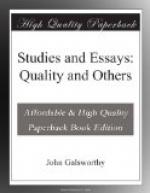Down here, too, where I stand, each separate function of the thresher has its appointed slave. Here Cedric rakes the chaff pouring from the side down into the chaff-shed. Carting the straw that streams from the thresher bows, are Michelmore and Neck—the little man who cannot read, but can milk and whistle the hearts out of his cows till they follow him like dogs. At the thresher’s stern is Morris, the driver, selected because of that utter reliability which radiates from his broad, handsome face. His part is to attend the sacking of the three kinds of grain for ever sieving out. He murmurs: “Busy work, sir!” and opens a little door to show me how “the machinery does it all,” holding a sack between his knees and some string in his white teeth. Then away goes the sack—four bushels, one hundred and sixty pounds of “genuines, seconds, or seed”—wheeled by Cedric on a little trolley thing, to where George-the-Gaul or Jim-the-Early-Saxon is waiting to bear it on his back up the stone steps into the corn-chamber.
It has been raining in the night; the ground is a churn of straw and mud, and the trees still drip; but now there is sunlight, a sweet air, and clear sky, wine-coloured through the red, naked, beechtwigs tipped with white untimely buds. Nothing can be more lovely than this late autumn day, so still, save for the droning of the thresher and the constant tinny chuckle of the grey, thin-headed Guinea-fowl, driven by this business away from their usual haunts.
And soon the, feeling that I knew would come begins creeping over me, the sense of an extraordinary sanity in this never-ceasing harmonious labour pursued in the autumn air faintly perfumed with wood-smoke, with the scent of chaff, and whiffs from that black puffing-Billy; the sense that there is nothing between this clean toil—not too hard but hard enough—and the clean consumption of its clean results; the sense that nobody except myself is in the least conscious of how sane it all is. The brains of these sane ones are all too busy with the real affairs of life, the disposition of their wages, anticipation of dinner, some girl, some junketing, some wager, the last rifle match, and, more than all, with that pleasant rhythmic nothingness, companion of the busy swing and play of muscles, which of all states is secretly most akin to the deep unconsciousness of life itself. Thus to work in the free air for the good of all and the hurt of none, without worry or the breath of acrimony—surely no phase of human life so nears the life of the truly civilised community—the life of a hive of bees. Not one of these working so sanely—unless it be Morris, who will spend his Sunday afternoon on some high rock just watching sunlight and shadow drifting on the moors—not one, I think, is distraught by perception of his own sanity, by knowledge of how near he is to Harmony, not even by appreciation of the still radiance of this day, or its innumerable fine shades of colour. It is all work, and no moody consciousness—all work, and will end in sleep.




